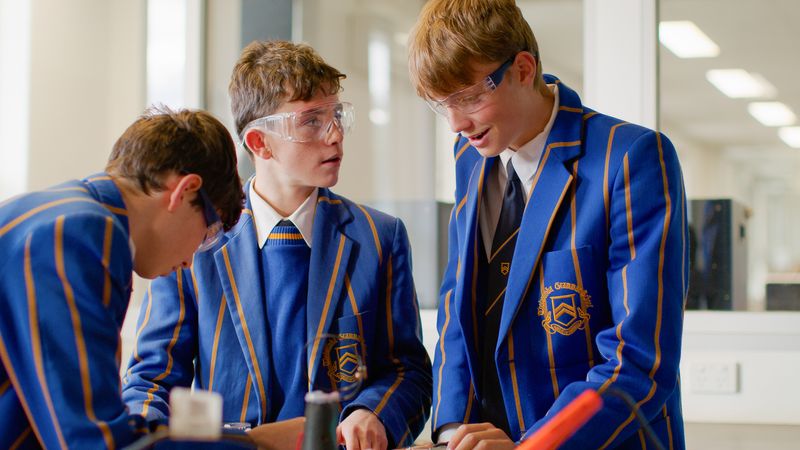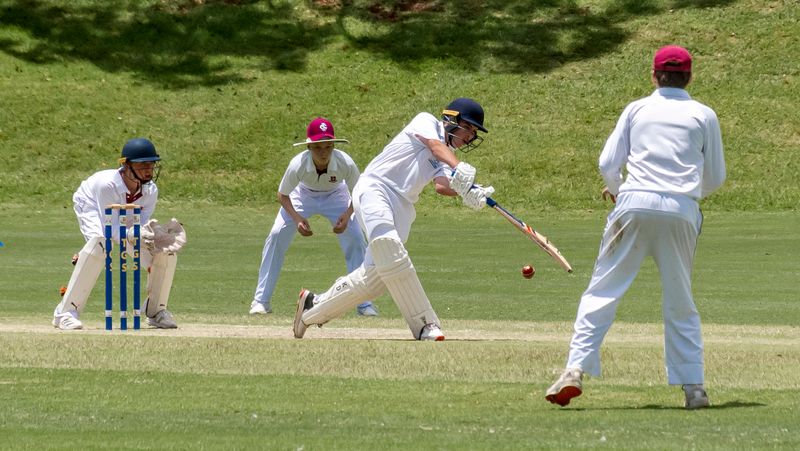“Many of the respondents spoke of controlling the controllables across six broad themes: Consistency and Routine, Using Study Tools, Environment Control, Intrinsic Motivation, Resilience and Perspective.”Mrs Crystal Hede, Director of Learning and Innovation

Giving students the opportunity to cope with disappointment has the capacity to shape their good character.
Schools are inherently hopeful and happy places. Their natural focus on growth, connectedness and preparing youth for a better future creates an optimistic atmosphere in which ambitions are born. These positive emotions and experiences lay the foundation for our expectations and while these can be highly motivating, they come with a catch: the greater our expectations, the greater the disappointments, too.
Disappointment is not a popular feeling. Rightly so, not many of us wish to feel sad, displeased or frustrated by the non-fulfilment of our hopes or expectations. However, in an academic setting, disappointments are inevitable and they can manifest in various forms. Commonly, students can find it hard to understand a concept that they see their peers comprehending and receive a lower-than-desired assessment result. Even worse, they can feel “robbed” of a grade that they believed to be rightfully theirs, not be with their preferred teacher, fall short of the required points for an academic award and face unexpected obstacles that disrupt their learning. Invariably, students will experience one or more of these things at some point in their schooling, possibly all of them, often.

For parents, it can be incredibly difficult to watch our children experience these things, especially when they result in further negative emotions such as shame or self-loathing. Sometimes, the worry we feel for our children is almost unbearable and it is natural to want to fix the problem for them. Prominent clinical psychologist, Dr Judith Locke is a leading voice on this topic. In her article, Kids need to fail. And parents need to let them; she says, “When your child is disappointed, it’s understandable you want them to feel better immediately, but taking temporary bad feelings away makes your child less capable to face inevitable trickiness in the future.” Locke goes on to say, “While I know it feels awful to watch your child be disappointed or sad, every time you help them avoid those feelings, you also sidestep them learning essential skills of resilience and a belief they will cope if life doesn’t always go their way.”

For these reasons, we will not shield students from experiencing disappointment at TGS. Doing so would be detrimental to their development and this fails to prepare them for the realities of life. Most importantly, giving students the opportunity to cope with disappointment has the capacity to shape their good character. As beautifully put by Irish politician Sir Boyle Roche, “Disappointment is the nurse of wisdom.”
I sought the wisdom of some of our older TGS students who have learned to manage their disappointments over time and even harness them for good. Specifically, I surveyed recipients of diligence awards because these recognise dedication and resilience rather than grades. All the respondents admitted to encountering setbacks and shared various versions of not letting these deter their efforts. One of the seniors said, “When faced with disappointment, I use ‘failure’ as a motivator to strive for improvement and apply the feedback I receive to make adjustments for the future.”
- Consistency and Routine: Diligent students emphasised the importance of sticking to a structured study schedule. They often study at the same time every day and for consistent durations to build a habit of regular learning.
- Using Study Tools: Many of these students use study trackers, whiteboards and diaries to reinforce learning and ensure they systematically cover all necessary material.
- Environment Control: They create and maintain separate spaces for study and relaxation to condition their minds for productive work when in the study zone. This includes removing any electronic devices from the study area.
- Intrinsic Motivation: Consistently, the diligent students spoke of a strong internal drive to improve and put in the effort required to overcome academic hurdles. This includes proactively seeking clarification or help.
- Resilience: Their responses demonstrated resilience in the form of a “bounce back” mentality. They spoke of accepting that not all decisions will be to their liking (for example, class allocations), acknowledging their negative emotions and then moving on in order to stay focused on their learning.
- Perspective: Maturely, some of the boys spoke about managing their expectations. While hopes and dreams can be powerful motivators, it’s important to balance them with realistic expectations to maintain a healthy mindset.
TGS Old Boy (2011-13) and 2024 Paris Olympic medalist, Matthew Denny recently spoke with our students, sharing some anecdotes and advice that aligned with the above sentiments. He said that one of the biggest things he learned from his career was that “Success lies on the other side of discomfort. You just need to step toward it and keep moving.” Matthew’s wise words support the notion that disappointment — a form of discomfort — is a natural and expected part of life that forms our character as we strive towards our goals and aspirations. With this in mind, our TGS boys need to keep dreaming but expect that disappointment will occur. They need to keep moving and trying and see disappointment as an opportunity for learning.
Reference
Locke, J. (2019, March). Kids need to fail. And parents need to let them. The Courier Mail. Retrieved September, 2024, from https://www.couriermail.com.au/rendezview/kids-need-to-fail-and-parents-need-to-let-them/news-story/5df007cfd72f50b4a22b03c39c127781
Latest Blog
2024 IBSC Conference
It is part of our Strategic Plan's People Pillar which is "build a high-performing culture that supports the wellbeing and development of staff, who exemplify the TGS values and share our commitment to the growth of our boys". In fact, that focus was acknowledged in our receiving The Educator’s 2024 5-Star Employer of Choice award. The Award acknowledges excellence in providing professional development opportunities and nurturing a culture of inclusion and respect. So it was with great pleasure…
Filmmaker, Storyteller and Visionary
From his days as a boarding student at Toowoomba Grammar School, where he first dipped his toes into the world of filming GPS sporting events, to his current roles as sports documentarian and founder of the Outback Film Club, Clancy’s journey is a testament to the power of passion and perseverance. Establishing Outback Film Club has been a real triumph The echoes of school war cries reverberating around the Chandler Aquatic Centre in 2011 marked the start of Clancy’s cinematic journey.…
A Cut Shot Above The Rest
Ben’s sport takes him to the best beaches on the planet, but his love of volleyball began back at Toowoomba Grammar School, inspired after seeing his older brother play. As Ben explains, he was hooked:
Gummingurru Excursion - Deep Time History of Australia on our Doorstep
Gummingurru is unique in being the best-preserved initiation site in southeast Queensland, including bora rings and various stone arrangements that have ancient links to the totems and kinship practices of the Jarowair and Giabal people of Toowoomba and the Darling Downs, as well as the broader region within the highly significant cultural landscape of the Bunya Mountains. The boys were welcomed to, and guided through, the site and its learning centre by Mr Shannon Bauwens, a Western Wakka…
Responding to Negative Peer Interactions
As we approach the end of Term 3, we find it is typically a time when boys start to get tired and emotional and are most likely to make poor decisions that can lead to relationship challenges between peers. Comments and humour shared between mates that may have been received without concern in the first week of the term may change as boys start to tire and their tolerance levels decrease. This may lead to boys reacting with heightened and overly emotional responses. This is normal as boys are…
Boarding is who we are
Our boarders make up nearly one third of our student cohort from Years 5 to 12, which enables us to consider the boarding experience in all that we do at the School. Every boarding experience at TGS is about equipping boys with the skills to function as a student and preparing them for their future.
Making a Positive Impact with Homework Assistance
The Anglicare Homework Assistance Program (HAP), run in conjunction with Darling Heights State School, sees many of our boys volunteer their time on Wednesdays after class to help many young refugee and primary school students facing challenging times with their homework, or to chat and play games. Our boys thoroughly enjoy meeting, supporting and learning about the lives of the younger children. This forges community connections and fosters inclusion for the Darling Heights students; it also…
Fresh Faces Guide - TGS Sportsmen into the Fray
With their dedication to excellence and player development, TGS athletes are in good hands as they navigate the challenges and triumphs of competitive sports.
Honouring Tradition, Preparing for the Future
They will invariably be inspired by effective teaching and the satisfaction of personal achievement will always be motivating. At Toowoomba Grammar School, the power of high-quality instructional practices has resulted in the development of a strong academic culture that has endured for nearly 150 years. Preserving core principles provides stability and continuity. However, we must be open to continuously adapting our methods so that our students are well-prepared for the ever-changing world…